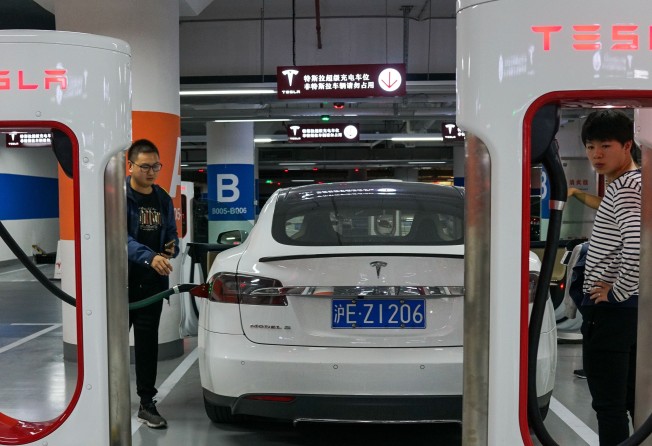China expected to extend electric vehicle tax rebate
Beijing will continue to exempt the 10 per cent purchase tax on new-energy vehicles at least through 2020, sources said

China is planning to extend a tax rebate on the purchase of new-energy vehicles after the incentive helped the country become the world’s biggest market for clean fuel automobiles, according to people with direct knowledge of the matter.
China’s government will continue to exempt the 10 per cent purchase tax on new-energy vehicles at least through 2020, the people said. The current tax rebate policy is due to expire at end of this year.
Shares of electric-vehicle makers jumped as extending the tax rebate will give a fillip to China’s development of the NEV industry, a term used to refer to electric vehicles, plug-in hybrids and fuel-cell cars.
The surge in demand for such vehicles in China has attracted billions of dollars of investments from companies such as Volkswagen and Ford Motor Co while Tesla is considering setting up a factory in the country. The Chinese government has recently announced a series of measures regarding manufacturing licenses and joint ventures that would allow foreign companies to set up solely owned assemblies.
Sales of NEVs surged 53 per cent to 500,700 units last year and boosted the overall ownership of such vehicles in the country to over a million units. That is more than triple the tally in 2015, according to the China Association of Automobile Manufacturers.
China’s government is working with regulators on setting a deadline for ending production and sales of internal-combustion vehicles, Xin Guobin, the vice-minister of industry and information technology, said in September. The world’s second-biggest economy, which has vowed to cap its carbon emissions by 2030 and curb worsening air pollution, joined the UK and France in seeking a timetable for the elimination of vehicles using petrol and diesel.
“China wants the number of NEVs to grow, and I’m sure they’ll take many additional steps if they’re not meeting their targets,” said Yunshi Wang, director of the China Centre for Energy and Transportation at the University of California, Davis. Eliminating the tax incentives abruptly would mostly hurt older manufacturers whose technology and manufacturing efficiency can’t match new entrants in China’s auto market, he said.
While the government wants to encourage consumers to buy more electric vehicles, the authorities are also concerned about overall subsidies. Different arms of the government have been working on plans to scale back overall subsidies on purchase of NEVs next year and a consensus has not yet been reached, according to people familiar with the discussion.
The government is also considering a resumption of new permits to make electric vehicles as early as the first half of 2018, a move that would clear the way for Ford and Tesla as well as a string of local manufacturers to start production, Bloomberg reported last month.